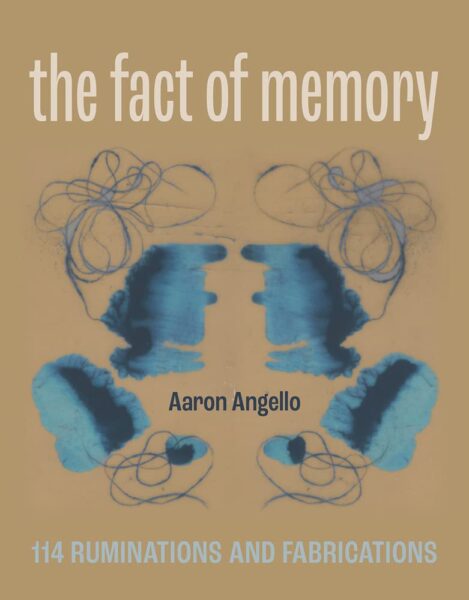
Reviewed by Amanda Krupman
Aaron Angello’s The Fact of Memory: 114 Ruminations and Fabrications (Rose Metal Press) is, in form, various: short, linked lyric essays; prose poems; response poems, denuded of context; and the cannibalization of a Shakespearean sonnet into a thematically related, book-length lyric essay. The result, a hybrid book of so-called ruminations and fragments, is another engrossing and inventive title from Rose Metal Press.
The front matter lays Angello’s process bare—a creative constraint taken on in workshop: Write each morning in response to a word from Shakespeare’s Sonnet 29, 114 words over 114 mornings. About this process, Angello elaborates, “I paid no attention to whether I was writing a prose poem, an essay, a story, or something else…My only rules were that I had to write in prose, I had to fill the page, and the piece couldn’t overflow onto the next one.”
Later, Angello revised and edited these drafts, pulling the pieces together as, he says, a “kind of long lyric essay.” The opening piece, “When,” works well as an introduction. Its first line—This is the imposition of narrative—seems to reference Joan Didion’s seminal essay “The White Album,” where she described our reliance on an “imposition of a narrative line upon disparate images.” Even as a New Journalist, Didion was committed to constructing cohesive narratives out of, as she called it, the “shifting phantasmagoria.” “The White Album” itself maps her effort to find throughlines and connection points amid increasing fragmentation and disconnection; as she writes, “We tell ourselves stories in order to live.”
Angello seems to pick up Didion’s thesis as he interrogates the word fact:
Here is a fact: the sky in Los Angeles is distant and uninteresting. Here is a fact: the sky in New York is distant and uninteresting and often obstructed by buildings…Here is a fact: it’s 5:30 in the morning and it’s dark outside. This fact will change. There will be the fact of memory of this darkness. But the facts will have changed.
Yet, in contrast to Didion, he is signaling The Fact of Memory’s easy embrace of fragmentation. There are throughlines to be found in The Fact of Memory, but Angello’s laidback lyricism shows none of Didion’s anxious parsing: “Some define lyric as a moment out of time, the opposite of narrative. A timeless locale. A place without when. A stigmata. The then folding back again into the then.“
In his author’s note, Angello speaks to the role of recollection, saying, “Memory is always, to some extent, a creative act. The fact of memory, one might say, is that it is never quite factual.” On one hand, Angello’s characterization of memory simply demonstrates a contemporary understanding of its fallibility. But this point of departure gets me thinking more broadly about this “fact of memory,” which, I think, underlies an extraordinary shift in much of our first-person, post-postmodern literature.
What exactly characterizes the post-postmodern? I like artist Luke Turner’s definition of metamodernism, which makes up part of his “Metamodern Manifesto”:
Whereas postmodernism was characterised by deconstruction, irony, pastiche, relativism, nihilism, and the rejection of grand narratives (to caricature it somewhat), the discourse surrounding metamodernism engages with the resurgence of sincerity, hope, romanticism, affect, and the potential for grand narratives and universal truths, whilst not forfeiting all that we’ve learnt from postmodernism.
Rather than a return to modernist thinking, Turner notes:
…metamodernism considers that our era is characterised by an oscillation between aspects of both modernism and postmodernism. . .The metamodern generation understands that we can be both ironic and sincere in the same moment; that one does not necessarily diminish the other.
If you accept this definition, then you might say that metamodernist writers like Angello have benefited from the performative literary experiments of their PoMo predecessors. Hybrid literature’s experiments in form and genre-blending are anything but abstract or academic. In contrast, the works, more often than not, earnestly seek connection and demonstrate a kind of radical transparency—writers bending form and genre to more perfectly externalize the underlying ideas and concepts therein.
Certainly, writers can sometimes stumble over these commitments and make mediocre or bad art. But take two of our most celebrated writers reinventing personal narrative and criticism today: Claudia Rankine and Maggie Nelson. Their works are consistently genre-defying, yet these writers are able to execute formal experiments that never sacrifice storytelling power or engagement with their readers.
The Fact of Memory achieves similar aims. Take the associative run in response to the word My, which begins:
My phone. My spate of absences. My imagination. My catalogue. My ever-growing collection of Raymond Chandler novels. My sympathies. My dog. My sense of self-worth coupled with my debilitating insecurity. My penchant for a well-made cocktail. My interpretation of my memories. My memories. My schedule. My favorite joke. My masculinity. My boots. My jacket. My limited Spanish. My reading habits. My wife. My plans. My guitars. My career (or lack of one)…
Near the end of the book, this list poem (which continues for many more lines) is a waterfall of character detail that had trickled through the book’s earlier sections. As an essayist and poet, Angello is always present and vulnerable in his writing. The Fact of Memory is a successful formal experiment as well as a tender exploration of personhood—recalled and reinvented, fabricated and fragmented.
________________________
 Amanda Krupman is a writer in Cleveland, OH. Her fiction and nonfiction have appeared in a number of literary journals and magazines including TriQuarterly, The Forge, Time Out New York, Punk Planet, and BLOOM. Amanda received an MFA from The New School’s graduate writing program and was a recipient of a Jerome Foundation Emerging Artist Award. Her stories and chapbook manuscripts have been honored or shortlisted for awards by Landing Zone Magazine, The Atlas Review, and Gertrude magazine.
Amanda Krupman is a writer in Cleveland, OH. Her fiction and nonfiction have appeared in a number of literary journals and magazines including TriQuarterly, The Forge, Time Out New York, Punk Planet, and BLOOM. Amanda received an MFA from The New School’s graduate writing program and was a recipient of a Jerome Foundation Emerging Artist Award. Her stories and chapbook manuscripts have been honored or shortlisted for awards by Landing Zone Magazine, The Atlas Review, and Gertrude magazine.

 The core workshop of SmokeLong Fitness is all in writing, so you can take part from anywhere at anytime. We are excited about creating a supportive, consistent and structured environment for flash writers to work on their craft in a community. We are thrilled and proud to say that our workshop participants have won, placed, or been listed in every major flash competition. Community works.
The core workshop of SmokeLong Fitness is all in writing, so you can take part from anywhere at anytime. We are excited about creating a supportive, consistent and structured environment for flash writers to work on their craft in a community. We are thrilled and proud to say that our workshop participants have won, placed, or been listed in every major flash competition. Community works.